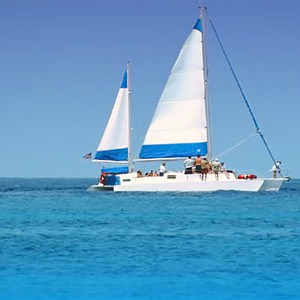Please Register / Login to take part in discussions about the Virgin Islands.
Hi.
Our group of 14 adults and 2 small children will be staying at the Tennis Villa and Cottage in St. John. These two properties have two cisterns. Because of the size of our group, we are planning to cook most of our meals at the villa and cottage. Is it safe to drink or cook with the cistern water?
Thanks!
The restaurants in Cruz Bay are most likely using water from the municipal water system that has been treated. The cistern water is what we are talking about here. Most of you seem to think that we are making much ado about nothing but I still buy and use bottled water rather than drink from the cistern. To each his own I guess.
>>>Is there a instant result water testing kit that one could take along to check to see if there are any harmful microbes in the water?
No, there's not.
>>>You go to a bar, order a mixed drink, a painkiller, a vodka and grapefruit, whatever, do you think they make their ice cubes out of bottled water?
Restaurants are different. Their water is tested regularly (monthly I've been told) and must past inspection. Villas don't have their water tested, and even if they have filtration systems in place, you'd have to trust that they're good enough. I will drink tap water at restaurants, but I will not drink tap water at villas.
You said "you just don't want anyone in your group to get sick" so I think the answer is.............................buy bottled 🙂
I don't drink the water from our cistern but I do clean my teeth with it (you know, rinse and spit) and use it for cooking pasta with, but I use bottled for coffee.
If you buy gallon jugs at St John Ice they are $1.00 each and only 50c to refill - a bargin by STJ standards 🙂
Pia
I used to work on these "high-end" villas with treatment systems and they almost always have a dead iguana in the tank. Buy bottled water at the grocery store and boil your cooking water.
Captain Carter positioned himself for maximum effect and issued a lulu of a line, swaying the tall palms for miles around, " they almost always have a dead iguana in the tank."
The secret is out... that is why our cistern water tastes so good...!
Pia, or others,
Where is "St John Ice"? Or are other places equally good for buying the large bottles? To hijack just a bit...Is there a "best" place to get the big bottles on St Thomas?
Thanks
C-CMom: I have seen the gallon machines in front of Food Center and Cost-U-Less on St Thomas. Haven't seen any dead iguanas in 'em, though! 😀
St John Ice is in the Lumberyard - just up the street from Mixology, opposite from Penns car rental if that helps 🙂
Pia
Thanks East Ender and Pia!
Personally, I never have, nor will I ever, drink water collected from a cistern in the Virgin Islands.
From Science Direct (abstract from a scientific journal re: Virgin Islands Cistern Water)
Abstract
Most homes and public facilities in the U.S. Virgin Islands use a roof catchment system to obtain drinking water. Because water is so scarce throughout the islands, every building (except those federally owned) are required to have a cistern. Rainwater is collected in the cisterns and is subject to contamination from enteric pathogens found in the environment. The objective of this study was to determine the occurrence and concentrations of human enteric protozoa in cisterns originating from animal fecal contamination. Volumes of 400 1 of water were filtered from nine private and four public cisterns four times over a 1-year period for a total of 44 samples. After processing the filter, the entire volume was examined using Cryptosporidium and Giardia specific antibodies and epifluorescence microscopy to determine levels of Cryptosporidium oocysts and Giardia cysts. One or both of the protozoa were found in 81% of the public cisterns and this was statistically significant (P = 0.005) when compared to the private cisterns where 47% of the samples were positive. Cryptosporidium was found statistically more often in the 44 samples than Giardia. In addition, the use of a polyclonal antibody for Cryptosporidium which is genera-specific, also detected oocysts statistically more often than a monoclonal antibody which was more species-restrictive to C. parvum, which is associated with disease in humans, suggesting that non-mammalian oocysts were found more frequently in cistern waters. Levels ranged from 1 to 10 organisms/100 1 with one sample at 70 oocysts. These levels are associated with estimated daily risks of 10−2 to 10−4 and are well above acceptable guidance as described for safe drinking water in the United States. On occasion high levels of heterotrophic bacteria (9.9 × 105 CFU/ml) and total coliforms (> 2000 CFU/100 ml) were also detected in these waters. A statistically significant correlation was found between the detection of Cryptosporidium spp. and Giardia spp. (r = 0.47853, P = 0.0008). The results of this study show that Cryptosporidium and Giardia, as well as bacteria, are present in these waters at levels which may involve significant public health risks. Public cistern systems are of particular concern because of the high percentage which were contaminated and the greater number of people exposed.
So, In conclusion, do as you will. Also, filter systems that are not maintained properly can be much worse then no filter at all, and some contaminants become more dangerous after boiling.
I'm told that 98.76 % of people that drink and bathe in VI water, even for a short time period, will become infected with a terminal case of the incurable disease known as islanditis. Unfortunates who have contacted islanditis have been known to suffer from symptoms such as excessive in-taking of rum and perpetual daydreaming about white sand beaches, open air bars and obsessive desires to visualize turquoise colored water. Though rarely fatal, islanditis has been known to reduce formerly productive people into puddles of poop.
And yet thousands or maybe millions of people drink or have drank cistern water and are still alive, go figure. remember we all need some germs in our bodies to build up out immune system.
How many millions of gallons of bottled water are sold each day in the continental us? Yet, on a day by day standard I bet most of us use tap for just about everything , including drinking. How clean are our septic systems? Rain water sounds pretty good.


